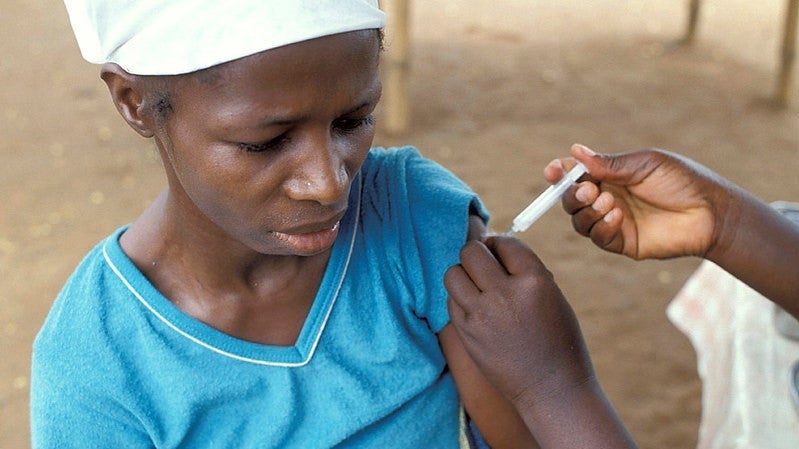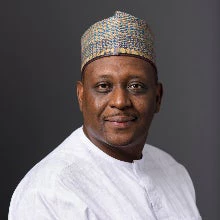 Woman getting vaccinated. Ghana. Photo: © Curt Carnemark / World Bank
Woman getting vaccinated. Ghana. Photo: © Curt Carnemark / World Bank
During the World Bank’s 2020 Annual Meetings last month, we had our focus firmly on the coronavirus pandemic and how it’s affecting lives and economies around the world. During the Global Health Roundtable we discussed how the world can invest in COVID-19 vaccines as well as strengthen the health systems that deliver primary care.
As we met, there had already been more than 41 million infections and more than 1 million deaths worldwide and COVID-19 infections were on the rise again around the world. The World Bank estimates that the pandemic will push up to 150 million people into extreme poverty by the end of 2021.
Against this urgent backdrop, the roundtable convened more than two dozen government ministers from developing countries, along with heads of UN agencies and international health organizations. Participants agreed that the world’s most pressing immediate priority is to speed the development and delivery of vaccines that can control the spread of COVID-19. And we need to ensure that vaccines are available equitably to all countries – particularly the poorest, which have the least resources to procure and deploy them.
Helping the poorest countries to fight COVID and build resilience
People everywhere deserve access to health protections, and in a pandemic, no one is fully protected until all of us are protected. Everyone around the virtual table agreed on these points, but we also recognized that it will be an enormous challenge to ensure fair and equitable distribution to the countries and people that have few resources.
At the World Bank Group, we’re determined to do all we can. During the meetings, President Malpass highlighted the announcement of a $12 billion financing package – the largest health financing package ever provided by the Bank – to help countries purchase and deploy COVID-19 vaccines, tests, and treatments. In addition, the Bank has COVID-19 emergency operations underway in over 100 countries. Through the Bank, IFC, and MIGA, the World Bank Group expects to make $160 billion available through mid-2021 to help low- and middle-income countries mitigate the pandemic’s health, social, and economic impacts.
Beyond the urgent response to COVID-19, we need to help countries build resilience. Our new Health Emergency Preparedness and Response Trust Fund (HEPRTF), for example, can help developing countries prepare better for disease outbreaks, including when they can’t access our regular financing. The fund just made its first allocation to Sudan, and we’re grateful to our donor partners: Japan for leadership in establishing the fund and the United Kingdom for ongoing technical assistance.
Strengthening health systems and primary care
Delivering vaccines quickly and equitably will demand tremendous collaboration. Roundtable speakers highlighted the need for robust supply chain infrastructure – such as transportation systems, logistics, and ultra-cold freezers – to deliver vaccines and treatments, including by using new digital technologies and information systems. The aviation industry will be particularly important in distribution. As one speaker noted, “vaccines don’t deliver themselves.”
Strengthening primary health care systems has long been central to the World Bank’s work in developing countries. Resilient systems will now be key not only to distributing vaccines, but also to ensuring that other critical services, especially maternal and child health, continue during a pandemic. Early estimates suggest that child mortality could rise by 45% with health services curtailed and less access to food.
Ministers agreed that the COVID-19 response needs to prioritize health and community workers and other high-risk populations , and that it’s vital to ensure vaccines are affordable by addressing payment and access bottlenecks.
They also described the challenge of raising sufficient domestic financing both to tackle the huge cost of fighting the pandemic and to strengthen their health systems for future outbreaks. Through IDA, the World Bank is working to provide critical investments in the poorest countries, as well as technical assistance and public expenditure reviews to help improve spending efficiency. International donor cooperation will also remain important to ensure timely financing and support.
Participants noted that private sector collaboration will be crucial to vaccine manufacturing and delivery in developing countries . IFC, the Bank Group’s private sector arm, has announced a $4 billion global health platform to help ramp up production of COVID-19 vaccines and therapeutics in advanced and developing economies alike – and to ensure that emerging markets can access them. IFC is also working with the vaccine partnership, CEPI, to map vaccine manufacturing capacity and identify bottlenecks.
Debunking misinformation
The roundtable underscored concerns about the spread of misinformation, myths, and skepticism about COVID-19 vaccines and immunization generally. Participants agreed that national and community-based communication campaigns are needed to defuse growing vaccine hesitancy and educate people about protecting themselves and their families from the virus. This includes the use of community and religious leaders as trusted channels to communicate correct information.
Partnering and investing for resilient recovery
Strong partnerships and cooperation, within countries and across regions, are at the heart of effective action to combat the pandemic. The Bank Group is collaborating on an extraordinary scale with a diverse coalition of international partners, including bilateral donors, multilateral development banks, UN agencies, foundations, health organizations, the private sector, and civil society.
For example, we are partnering with the Access to COVID-19 Tools Accelerator (ACT-A), a global collaboration aimed at speeding the development and availability of COVID-19 tests, treatments, and vaccines and we support the COVAX facility led by Gavi, WHO and CEPI. We believe that benefits can be achieved through a pooled risk-sharing mechanism for accessing vaccines and we will continue to collaborate with Gavi and other partners in refining it.
The road to a resilient recovery will demand massive investments across countries, as well as sustained commitment and financial support from the international community. Rebuilding better will require bold reform agendas, with policies that create fiscal space and ensure more and better investment in health and pandemic preparedness . Given the unprecedented blow to countries’ human capital, we must also keep children learning, improve digital access, and speed up job creation.
The World Bank Group stands ready to support developing countries as they fight this crisis and work toward a more resilient and inclusive recovery.


Join the Conversation